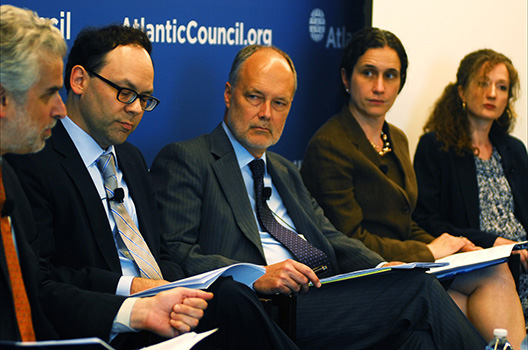 On June 14, 2015, the Atlantic Council’s Strategy Initiative hosted a public event introducing the results of the Pew Research Center’s 2015 “US Image and Balance of Power” survey. The event focused on global perceptions of the United States when positioned against countries like China, as well as on reactions to major US responses to world issues. Amb. Cunningham opened the event, emphasizing the importance of understanding public opinion in order to form a strategic vision, especially as we enter another US presidential campaign.
On June 14, 2015, the Atlantic Council’s Strategy Initiative hosted a public event introducing the results of the Pew Research Center’s 2015 “US Image and Balance of Power” survey. The event focused on global perceptions of the United States when positioned against countries like China, as well as on reactions to major US responses to world issues. Amb. Cunningham opened the event, emphasizing the importance of understanding public opinion in order to form a strategic vision, especially as we enter another US presidential campaign.
Dr. Richard Wike from the Pew Research Center presented the survey’s key findings. Individuals in forty different countries in different regions of the world were polled in late March through late May of 2015. The United States was mostly viewed positively in every region but the Middle East and was viewed most favorably in Africa, continuing long-term trends. A notable exception is Russia, where the percentage of people who view the United States in a positive light has declined sharply in from 51% to just 15%, likely attributable to mounting tensions over Ukraine. While the US has grown in favorability in India, it has fallen in Israel due to negotiations with Iran.
Wike also analyzed poll results related to specific US policies. The use of US military power to combat ISIS is strongly supported around the world, except for in Latin America, where Wike believes the threat posed by ISIS appears distant. Wike also discussed what the Pew poll showed about the global balance of power. When asked whether China has already or will eventually replace the United States as a global superpower (a term purposefully kept vague), 48% of respondents believed China has or will overpower the United States while 35% believed it never would. These numbers were fairly consistent across regions of the globe. However, only 39% of people surveyed believed that China respects the personal freedoms of its people. Wike also noted that the survey results showed the economic balance of power shifting back in favor of the United States in the years following the financial crisis. Following Wike’s presentation, the Atlantic Council’s Barry Pavel moderated a panel discussion featuring Dr. Wike, Atlantic Council Senior Fellow Jim Cunningham, American University Distinguished Scholar In-Residence Nora Bensahel, and Atlantic Council Millennium Fellow Claire Yorke.
